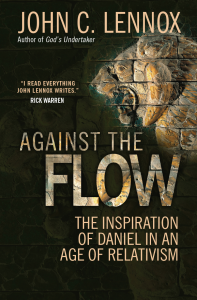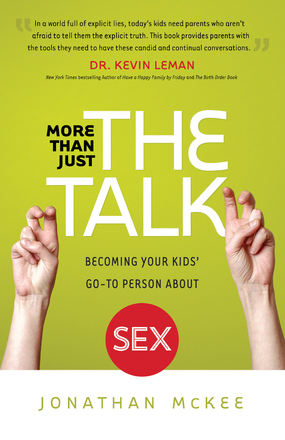Rick Warren says he reads everything John Lennox writes. That is now my goal too, and each Lennox book I’ve read has taught me so much.
John Lennox, mathematics professor at Oxford, has spent years demonstrating that believing in God not only makes sense but is actually more compatible with physical reality is than atheism is. In his books and debates he is definitely going against the flow.
And now, in this latest book, he discusses the whole concept of going Against the Flow. Instead of writing about the interface between science, religion, and philosophy as he usually does, he writes about the book of Daniel. Instead of discussing apologetics (i.e. logically defending one’s faith using information), he tells the reader how to be an apologist, how to stand firm for God.
Thus this book is desperately needed in our culture.
Many of us want to honor God in public, but it is so difficult to know when and how to be courageous, how courage relates to prudence, and what those terms actually mean. Lennox uses the book of Daniel to discuss how to ‘give unequivocal, courageous public expression’ to what we believe and to ‘make sure in advance that our minds and hearts are prepared’ to do so. His years of doing so himself infuse the book with both realism and inspiration.
In Against the Flow: The Inspiration of Daniel in an Age of Relativism, Lennox defends the truth of the Bible and that truth’s implications in a skeptical world. The book of Daniel shows that God is involved in human history, a statement of immense import. Then why did God not stop the fall of Jerusalem, which Daniel experienced as a youth? One of the main foci of Daniel’s work is grappling with the moral difficulties history presents, understanding the idea that God has individual plans for those who trust him and for all of history, and that what seems like harm from our point of view looks different from God’s eternal perspective. This also leads to an understanding of Daniel’s visions in which evil is shown to prevail at times. Knowing that God not only knows this but has planned it can bring great comfort to his suffering people.
After this introduction, Lennox goes through Daniel chapter by chapter, highlighting the historicity of the book and its affirmation that there is much more to the world than we can see. Despite the opinions of modern cynics and ancient kings, God does exist and he does act in this world, revealing himself to mankind. Nebuchadnezzar, Belshazzar, and Darius discovered this during their lifetimes; one goal of apologetics is to show this truth to modern cynics before it is too late for them.
But there is more to Daniel than the dramatic stories we all know. This godly man also saw horrific visions of the future. Lennox goes through them as well, not with speculative interpretations but rather to explain their detailed relation to history, their implications for the future, and the comforting truth that God is in control even though he does, at times, let evil powers seem to be in charge.
Although Lennox interacts with the text in profound and orthodox ways, this is not a typical Bible study guide. Instead it is an encouragement and an eye opener for believers who are taking a stand for truth and it would probably speak to open-minded questioners and searchers as well.
Throughout Against the Flow, Lennox’s passion is to show that God has revealed himself in this world and that he knows and directs the future even though at times it seems he is not acting. He also emphasizes the importance of moral living and making godly choices. This two-fold focus inevitably leads to discussions of determinism and human choice. Lennox asserts both God’s sovereignty and man’s responsibility and wisely refuses to address this mystery in more detail than the Bible does. Intriguingly he does point out that God’s relation to time itself is mysterious and beyond us and may hold part of the key to this mystery. People of all theological opinions could argue against him if they were in the mood to do so, but in a charitable frame of mind most of us could also agree with much of what he says. In any case, we all can definitely learn from him.
Several detailed appendices provide more information on various topics.
I found Against the Flow both inspiring and encouraging. It gave me a whole new way of looking at Bible discussions with questioners and atheists. For example, the questions sceptics have about Daniel include its dating and its predictions, suggesting that there can’t be ‘someone out there’ who knows about and enters into our world—and the book of Daniel itself addresses that question over and over. The great emperor Nebuchadnezzar himself even wrote a chapter to point out that God can and does step into history and that he guides it as he wills. Lennox shows how the book itself answers sceptics’ questions…and how, if they do not accept, it they also, like Nebuchadnezzar, lose their ability to think with a clear, human mind.
In Against the Flow: The Inspiration of Daniel in an Age of Relativism Lennox discusses a culture similar to ours in many ways. He shows how Daniel, a devout believer, lived openly for God in the most influential positions. Daniel lived Against the Flow, and as our culture wanders further away from its Christian roots, we will need to do so more and more, too. Lennox shows us how, both in his masterfully crafted use of the book of Daniel itself to answer its critics, and in the many nuggets of practical Biblical wisdom he has scattered throughout.
I highly recommend this book for anyone, teen or adult, who wants to live Against the Flow and glorify God in all things. It would be an excellent addition to an upper-level high school reading list.
—
Note: Although Lennox does not emphasize his belief in theistic evolution in this book, this belief does lead him to a question that was answered beautifully during the Reformation:
But does not God do man an injustice by requiring in his law what man cannot do?
No, for God so created man that he was able to do it. But man, at the instigation of the devil, in deliberate disobedience robbed himself and all his descendants of these gifts. (Heidelberg Catechism Question and Answer 9)
This question and others also form part of his discussion of God’s sovereignty and man’s responsibility, an issue of Biblical interpretation that has been grappled with through the ages and is powerfully summed up in various Reformation documents. Of course, these topics are not a main part of this book, but anyone considering Lennox’s discussion would do well to consult the thoughts of wise and godly men of the past.
—
Other John Lennox books I’ve read and recommend, with links to my reviews:
God’s Undertaker, which I’m reading for the third time and hope to review in the next few months. An essay covering much of the same material forms part of Beyond Opinion by Ravi Zacharias.
More information is available about John Lennox, his books, and his resources.
I also recommend the review at Create with Joy; other reviews are available at the LitFuse Blog Tour page.
This is yet another book in the in the 2015 52 Books in 52 Weeks Challenge and is also linked to Saturday Reviews, Booknificent Thursdays, Literacy Musings Monday, and The Book Nook. For more encouragement, visit Finishing Strong, Trivium Tuesdays, Raising Homemakers, Titus 2 Tuesday, Monday’s Musings, R&R Wednesdays, Faith Filled Fridays.
Disclosure: I received a review copy of this book from LitFuse and have shared my own opinions.






